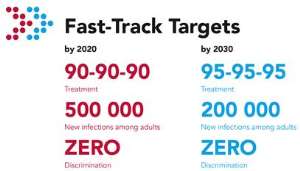
Ghana has failed to meet the 90-90-90 strategy for HIV-infected individuals which was introduced in 2017 in Ghana, says Ghana AIDS Commission which struggles to achieve the set targets.
The 90-90-90 strategy was a plan aimed at reducing the HIV epidemic to a low-level endemic disease by 2030.
The strategy stipulates that 90% of individuals infected with the virus should be diagnosed by 2020, 90% of whom will be on antiretroviral therapy (ART) and 90% of whom will achieve sustained virologic suppression.
But the implementation of the strategy seems to be limping in Ghana as 75% of the first 90 has not been achieved.
According to Dr, Badu Sarkodie, the Director of Public Health, the target may be reviewed as stakeholders are trying to push themselves to achieve it.
Dr Badu Sarkodie spoke to Citi News in Koforidua where a 2019 joint TB/ HIV annual review meeting took place with the 90-90-90 targets high on the agenda.
“The relevance is that when you test and treat all that is the sure indicator for eliminating the HIV advent and as much as possible, we have to do everything possible and ensure that the first 90, we will look at the key populations where most of the cases are, identify them and put them on treatment. Working with partners, the country never runs out of anti-retroviral treatment for some years. A figure which is lower in any of the various stages then it means that the interventions there are not being applied adequately and we use this review process to address some of the challenges that we have so that by the end of the year we will be in the position or would have achieved the 90-90-90.”
But the Programs Manager for the National HIV/ STI control program Dr Stephen Ayisi Addo who believes HIV care and related deaths have improved over years says the biggest challenge of the commission has been funding which is not corresponding to the scale-up of the commission.
“The biggest challenge has been that we have been going through a transition, as you increase the numbers you need more support and funding and yet the funding is reducing. So that is one of the transitions, we are noticing where funding is reducing and yet we are scaling up because we are increasing the numbers, unfortunately, it has not been matched by the same HR and human resources are determined by the general health system and so that is one sector we need to look at.”
---citinewsroom




 Former Kotoko Player George Asare elected SRC President at PUG Law Faculty
Former Kotoko Player George Asare elected SRC President at PUG Law Faculty
 2024 elections: Consider ‘dumsor’ when casting your votes; NPP deserves less — P...
2024 elections: Consider ‘dumsor’ when casting your votes; NPP deserves less — P...
 You have no grounds to call Mahama incompetent; you’ve failed — Prof. Marfo blas...
You have no grounds to call Mahama incompetent; you’ve failed — Prof. Marfo blas...
 2024 elections: NPP creates better policies for people like us; we’ll vote for B...
2024 elections: NPP creates better policies for people like us; we’ll vote for B...
 Don’t exchange your life for wealth; a sparkle of fire can be your end — Gender ...
Don’t exchange your life for wealth; a sparkle of fire can be your end — Gender ...
 Ghana’s newly installed Poland train reportedly involved in accident while on a ...
Ghana’s newly installed Poland train reportedly involved in accident while on a ...
 Chieftaincy disputes: Government imposes 4pm to 7am curfew on Sampa township
Chieftaincy disputes: Government imposes 4pm to 7am curfew on Sampa township
 Franklin Cudjoe fumes at unaccountable wasteful executive living large at the ex...
Franklin Cudjoe fumes at unaccountable wasteful executive living large at the ex...
 I'll 'stoop too low' for votes; I'm never moved by your propaganda — Oquaye Jnr ...
I'll 'stoop too low' for votes; I'm never moved by your propaganda — Oquaye Jnr ...
 Kumasi Thermal Plant commissioning: I pray God opens the eyes of leaders who don...
Kumasi Thermal Plant commissioning: I pray God opens the eyes of leaders who don...
